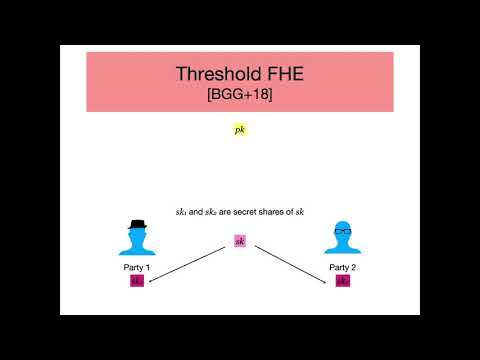CryptoDB
Secure MPC: Laziness Leads to GOD
| Authors: | |
|---|---|
| Download: | |
| Abstract: | Motivated by what we call "honest but lazy” parties in the context of secure multi party computation, we revisit the notion of multi-key FHE schemes (MFHE). In MFHE, any message encrypted using a public key pk_i can be "expanded" so that the resulting ciphertext is encrypted with respect to a set of public keys (pk_1,..,pk_n). Such expanded ciphertexts can be homomorphically evaluated with respect to any circuit to generate a ciphertext ct. Then, this ciphertext ct can be partially decrypted using a secret key sk_i (corresponding to the public key pk_i) to produce a partial decryption p_i. Finally, these partial decryptions {p_{i}}_{i in [n]} can be combined to recover the output. However, this definition of MFHE works only for n-out-of-n access structures and, thus, each node in the system is a point of failure. In the context of "honest but lazy” parties, it is necessary to be able to decrypt even when only given a subset of partial decryptions (say t out of n). In order to solve this problem, we introduce a new notion of multi-key FHE designed to handle arbitrary access patterns that can reconstruct the output. We call it a threshold multi-key FHE scheme (TMFHE). Our main contributions are the following: * We formally define and construct TMFHE for any access structure given by a monotone boolean formula, assuming LWE. * We construct the first simulation-extractable multi-string NIZK from polynomially hard LWE. * We use TMFHE and our multi-string NIZK to obtain the first round-optimal (three round) MPC protocol in the plain model with guaranteed output delivery secure against malicious adversaries or, more generally, mixed adversaries (which supports "honest but lazy” parties), assuming LWE. * Our MPC protocols simultaneously achieve security against the maximum number of corruptions under which guaranteed output delivery is achievable, depth-proportional communication complexity, and reusability. |
Video from ASIACRYPT 2020
BibTeX
@article{asiacrypt-2020-30690,
title={Secure MPC: Laziness Leads to GOD},
booktitle={Advances in Cryptology - ASIACRYPT 2020},
publisher={Springer},
doi={10.1007/978-3-030-64840-4_5},
author={Saikrishna Badrinarayanan and Aayush Jain and Nathan Manohar and Amit Sahai},
year=2020
}

